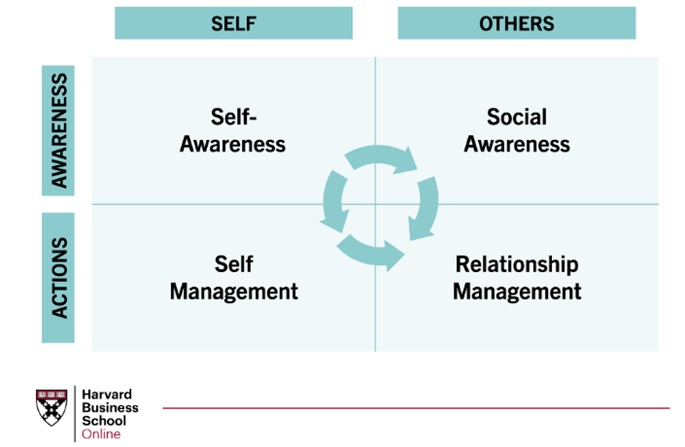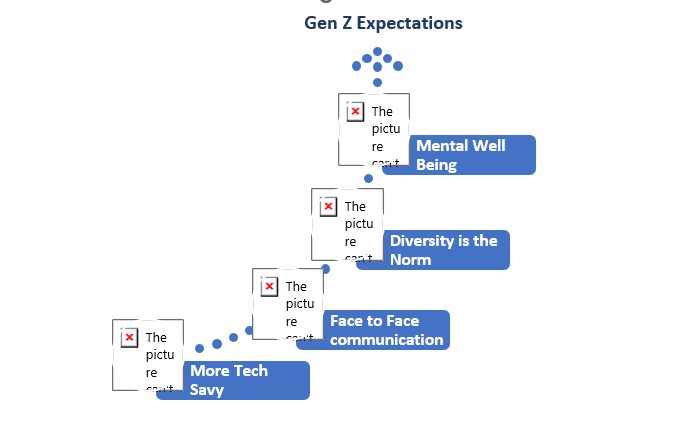HR Management : Emotional Intelligence in the Modern Workplace

By Sumoy Kumar Palit | Executive Director (HR), Pipelines Head Office | Indian Oil Corporation Limited
Introduction
Incident 1: An employee’s close family member has just passed away, and she is grieving and emotionally distraught. Her boss, lacking emotional intelligence, coldly approaches the employee and immediately asks about work completion without showing any concern for her emotional state. The boss dismisses the impact of the loss on the employee and emphasizes the importance of work over personal matters. The boss did not offer any support or understanding, leaving the employee feeling unsupported and unvalued during this difficult time.
Incident 2: An employee informs his boss that he will be taking another vacation with his family on a weekly off day. The boss, displaying a lack of emotional intelligence, confronts the employee publicly and lectures him about taking vacations too often. The boss makes no effort to understand the reasons behind the employee’s frequent requests and disregards any potential personal challenges the employee might be facing. Instead of offering a supportive approach to help the employee manage both work and personal life, the boss criticizes and discourages the employee from taking any further vacations. This leads to a stressed relationship between the boss and the employee and creates a negative work environment.
Emotional Intelligence (EI) plays a crucial role in how individuals interact with others, especially in the workplace. It influences how we manage our emotions, handle relationships, and navigate social dynamics. Without EI, leaders and employees may struggle with empathy, communication, and conflict resolution, which can create a negative work environment and hinder overall team performance.
Emotional intelligence was popularized by psychologist Mr. Daniel Goleman in his 1995 book Emotional Intelligence: Why It Can Matter More Than IQ, where he emphasized that emotional skills are just as important as cognitive intelligence in determining success. In the workplace, EI is essential for building strong relationships, fostering collaboration and maintaining a positive environment where employees feel valued and understood.
Unlike traditional workplaces, where rigid hierarchies and procedural efficiency often stifled emotional expression, contemporary organizations recognize that emotions are integral to productivity and innovation. This evolution has been accelerated by the influx of Gen Z employees, the rise of AI-driven processes, and the growing prevalence of challenging work assignments in hardship locations. Furthermore, the concept of couple employees and their unique challenges underscores the need for empathy and adaptability in HR strategies. Emotional intelligence (EI) is an invaluable asset in navigating the complexities of modern professional environments.
Need for Emotional Intelligence in the Workplace

As per HBR Online 2019 insights, Emotional Intelligence (EI) in a workplace is essential for success, with four key competencies: self-awareness, self-management, social awareness and relationship management. Self-awareness helps individuals understand their emotions, strengths and weaknesses, with 360-degree feedback being a valuable tool for improvement. Self-management involves controlling emotions under stress and responding thoughtfully, while social awareness, particularly empathy, enables better communication and collaboration. Leaders who excel in empathy make better decisions and coaching. Lastly, relationship management focuses on resolving conflicts and influencing others, which is critical for team cohesion and morale, as respectful treatment is key to job satisfaction.
Further, Emotional Intelligence (EI) in a workplace can be strengthened in the following ways:

Seek feedback: In any workplace the process of giving and receiving feedback is vital. It not only helps in employee productivity but also keeps them engaged and motivated. But the process is often hopeless. Managers or higher authorities almost always do not give much of a thought into it, making the process very ineffective.
When you are emotionally intelligent, you understand the importance of giving and receiving feedback. You know how to give and receive feedback constructively.
Dealing with Challenging Work Relationships: Do you have a difficult boss or find it hard to connect with your teammates because your views don’t align? These kinds of conflicts can get in the way of your goals and job satisfaction. But when you’re emotionally aware, you can better understand your colleagues’ behaviours and actions, helping you navigate challenges and work towards building more positive, collaborative relationships. Instead of letting differences create tension, emotional intelligence allows you to approach situations with empathy and find ways to get along with others, even when opinions clash.
Handling Change: We’ve all heard that “change is the only constant in life,” and it’s true in the workplace too. No matter what role you’re in, change will always come. Emotional intelligence helps you handle these shifts, allowing you to adapt and grow with them rather than resist or feel overwhelmed. Being able to manage your emotions during periods of change helps you stay focused and positive, making it easier to adjust to new circumstances.
Pay attention to your emotions: We’ve all experienced setbacks – maybe a project you poured months of work into gets cancelled, or you failed to meet a target. Sometimes, things don’t go as planned and that can be discouraging. But with emotional intelligence, you see these failures as opportunities to learn and grow. Instead of getting stuck or discouraged, you use each setback as a chance to improve, gaining experience that helps you move forward stronger and more capable.
Emotional Intelligence – A Bridge between Traditional and Modern Workplaces
Modern workplaces, emphasize collaboration, inclusivity, and holistic employee well-being. Emotional intelligence has become a critical competency for leaders and employees alike. Recognizing that emotions drive decision-making, creativity, and collaboration, organizations now strive to create environments where individuals feel heard, valued, and motivated.
Key Features of Modern Workplaces:
- Empathy-Centered Leadership: Managers are expected to build trust and rapport with their teams.
- Flat Hierarchies: Open communication channels encourage innovation and shared decision-making.
- Mental Health Initiatives: Programs addressing stress, burnout, and emotional well-being are widely adopted.
The transition from traditional to modern workplaces emphasizes the growing importance of emotional intelligence. Leaders equipped with EI foster environments where employees thrive, balancing the demands of efficiency with the necessity of empathy. This shift has also necessitated new approaches to recruitment, training and employee engagement, prioritizing interpersonal skills alongside technical competencies.
“The emotionally intelligent leader understands that people are the lifeblood of an organization and treats them as such.”
The Influence of AI on HR Processes and the Human Touch
The adoption of artificial intelligence in HR has transformed how organizations approach recruitment, employee engagement, and performance management. AI-driven systems are now capable of screening resumes, scheduling interviews, analysing employee sentiment, and even predicting attrition rates. These technologies provide unparalleled efficiency and data-driven insights, reducing administrative burdens and enabling HR professionals to focus on strategic initiatives.
Key Applications of AI in HR:
- Recruitment: Automated resume screening and candidate ranking.
- Employee Engagement/Employee Experience: Sentiment analysis through AI tools to gauge employee morale.
- Performance Management: AI-powered platforms analyse productivity metrics and offer personalized feedback.
- Learning and Development: AI identifies skill gaps and recommends tailored training programs.
AI brings many benefits in terms of efficiency, but it often lacks the ability to understand the nuances of human emotions and relationships. Relying too much on AI in HR can unintentionally make key interactions feel less personal. For example, automated feedback can feel impersonal and may not take into account the specific challenges an employee is facing. When it comes to conflict resolution, AI can’t provide the empathy and understanding needed to navigate emotional issues. Career development is another area where employees often look for mentorship and guidance, something AI can’t fully replicate.
Organizations need to find the right balance between using AI and keeping the human element in HR. Emotional intelligence (EI) is key to this balance, ensuring that AI supports and enhances personal interactions, rather than replacing them. By combining the efficiency of AI with the empathy and understanding of EI, HR can create a more meaningful and effective experience for employees.
One way to maintain this balance is by having human oversight in decision-making. This means ensuring that important HR decisions are still reviewed by people who can bring emotional intelligence to the process. It’s also important to train HR teams in emotional intelligence, so they can work alongside AI to better understand and support employees. Additionally, AI systems should be designed with the employee experience in mind, considering the emotional aspects of work life. Finally, organizations should give employees a way to provide feedback on AI-driven processes to ensure their concerns are addressed.
Imagine an employee receiving automated feedback that highlights their declining performance metrics. Without context, this feedback might demoralize the employee, ignoring factors like personal challenges or team dynamics. An emotionally intelligent HR professional could step in to discuss the feedback empathetically, identify underlying issues, and collaboratively develop a plan for improvement.
“Technology should be a tool to enhance human potential, not a replacement for the human connection.”
Gen Z Expectations and Emotional Intelligence

Gen Z, the youngest generation in today’s workforce (born between 1997 and 2012), brings a fresh perspective to work. They care deeply about meaningful work, mental health, and inclusivity. Unlike previous generations, they want to work in environments that celebrate individuality, encourage teamwork, and offer room for both personal and professional growth.
| Gen Z Expectations |
Gen Z is highly tech-savvy, growing up with technology and quickly adopting new tools and platforms. They place a strong emphasis on diversity and inclusion, expecting companies to take an active stand on social justice. Work-life balance is crucial to them, with a strong focus on mental health and the flexibility to maintain a healthy balance between their work and personal lives. They also appreciate regular feedback, as they want to understand how they can improve and grow in their roles.
Emotional intelligence (EI) is essential for understanding Gen Z’s needs. Leaders and HR teams who are emotionally intelligent can create an environment where Gen Z feels understood and engaged. Effective communication, where leaders actively listen and respond with empathy, is key. By recognizing the individual strengths and goals of Gen Z employees, companies can foster a more personalized and supportive environment. Gen Z is highly inclusive, with the ability to form global connections and easily access information on international injustices through online platforms. This constant exposure has led to them being recognized as the most supportive generation of social equality. Transparent feedback that encourages growth and focuses on development also helps build trust and strengthens relationships. Additionally, providing mental health resources and creating a culture that prioritizes well-being are essential for Gen Z’s engagement.
While Gen Z may have high expectations, these can actually push organizations to become more empathetic and innovative. By developing emotional intelligence, leaders can bridge generational gaps and build a culture of trust and collaboration. Meeting the needs of Gen Z can lead to a more inclusive and productive workplace.
“To connect with Gen Z, leaders must show empathy, be authentic and be open to change.”
Emotional Intelligence in Crisis Management
Crises in the workplace—whether personal, organizational, or societal—can shake people and disrupt routines. In these moments, leaders need more than problem-solving skills; they need emotional intelligence (EI). Leaders who show empathy, adapt to the situation, and communicate clearly can help their teams navigate the uncertainty, reduce stress, and recover stronger.
Take layoffs, for example. Letting employees go is never easy, but how leaders handle it makes a big difference. Leaders with EI communicate openly about why the layoffs are happening and what support is available for affected employees. Instead of being cold or distant, they show understanding and compassion. They might offer help with finding new jobs or provide emotional support during the transition. This not only eases the pain for employees but also reassures the remaining team that their leaders care about people, not just numbers.
Cultural Sensitivity and Emotional Intelligence
Workplaces today are more diverse than ever, with employees from different cultural, social, and personal backgrounds working together. This includes diversity in caste (such as SC, ST, and OBC), people with disabilities, and other unique identities. To ensure everyone feels valued and respected, leaders need emotional intelligence (EI) to foster understanding and reduce biases. Leaders with EI don’t just acknowledge these differences – they actively create an inclusive environment where every individual feels heard and supported. When it comes to supporting employees with disabilities, EI helps leaders understand their unique needs and make adjustments to ensure they feel fully included in the workplace.
Conflict resolution is another area where cultural sensitivity and EI are crucial. By combining emotional intelligence with cultural sensitivity, leaders can create a workplace where diversity is celebrated and everyone – regardless of background or ability – has the opportunity to thrive. This means going beyond just policies to building a culture of empathy, fairness and inclusion.
Ways to Improve Emotional Intelligence in the Workplace
Active listening: When you actively listen to your peers or any members in your workplace, you bring more clarity to the conversation. This helps you understand other’s perspectives clearly and build respect and healthy work relationships. Emotionally intelligent people practice active listening and also observe other’s body language while doing so.
Stop Reacting: Stop reacting and start responding more. Emotionally intelligent people know how to respond to a bad situation, conflicts or emotional outburst. They know how to stay calm and deal with a stressful situation without losing patience.
Stay self-motivated: You often meet unmotivated people who always find their way to misery and excuses. And then you come across people who are cheerful, happy and ready to tackle any difficult problems. The second kind is people with high emotional intelligence. They are ready to face problems and give their best to solve them. They are always self-motivated and resilient.
Cultivate a culture of cooperation: Promoting better cooperation among employees can reduce turnover and absenteeism by boosting morale, increasing productivity and creating a sense of pride. To cultivate a cooperative work culture, offer opportunities for employees to connect outside of work through team-building activities or informal gatherings, encourage participation in workplace engagement activities and actively engage employees by asking for their input.
Empathize: Being able to put ourselves in the shoes of other people and imagine their pain, their problems, their workflows and speed bumps have been invaluable. When you empathize with people, you build a connection and relate to them on a human level. Empathizing with others help you build respect and healthy relationships. People with high EI understands people from their frame of reference and possess this trait of keeping themselves in another’s position.
Conclusion
We live in an age when we can earn a certification in any number of topics to boost our careers, thanks to technology, but sadly we can’t earn one in emotional intelligence. That’s something we have to address as individuals, to recognize it as important, choose to improve it and continue to work on it – probably for the rest of our lives. But the payoffs are worth it as we become better employees, better spouses and all-around better people. The journey to enhancing emotional intelligence is ongoing. It requires a collective commitment from individuals, teams, and organizations to prioritize humanity, inclusivity and adaptability.
“In a world increasingly driven by technology, emotional intelligence will remain the defining trait of successful leaders, engaged employees and thriving organizations.”
(Shilpa Bichitra | Special Edition | 2024)
Categories
-
Agriculture & Rural Development11
-
Banking & Insurance4
-
Coal & Mines5
-
Defence & Defence Production5
-
Engineering & Technology3
-
Environment & Pollution1
-
Export & Import1
-
Housing & Urban Development1
-
Human Resources & CSR Initiatives2
-
Iron & Steel3
-
Logistic & Warehousing2
-
Micro, Small & Medium Enterprise3
-
Petroleum & Natural Gas6
-
Post & Telecommunication2
-
Power & Energy3
-
Tourism & Leisure2

